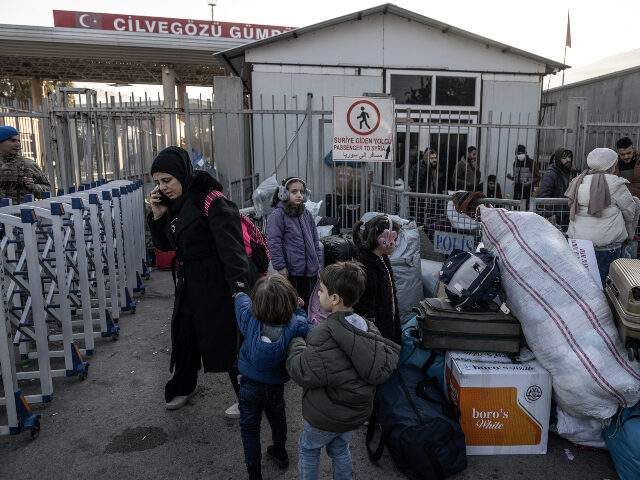Turkish mayors belonging to the opposition Republican People’s Party (CHP) are offering Syrian refugees free one-way tickets back home, now that dictator Bashar Assad has been overthrown.
Critics say the campaign is condescending, discriminatory, and sends a rather unsubtle “get out” message to the refugees, who may find that Syria under the control of Islamist extremists is no safer than it was under the murderous Assad regime.
Middle East Eye (MEE) on Monday quoted some Turkish media outlets that condemned the free ticket home campaign as outright “racist,” even though the CHP mayors expressed respect and compassion for their Syrian “brothers.”
“We watched with great excitement the celebrations of our Syrian brothers and sisters! We couldn’t remain indifferent to this enthusiasm and would like to express that we are ready to provide every service necessary to bid farewell to our esteemed guests under better conditions on the Turkish side of the Oncupinar Border Gate,” CHP mayor Hakan Bilecen said in his offer to help those esteemed guests return to Syria.
Turkey took in over three million Syrian refugees during the decade-long civil war next door, and the question of how long they could stay has loomed over Turkish politics since the first group arrived.
The refugees occasionally demonstrate and riot over what they describe as unfair or even predatory treatment by their Turkish hosts, while Turkish residents of refugee neighborhoods have blamed the Syrians for all sorts of criminal behavior.
Turkish President Recep Tayyip Erdogan has grown substantially more aggressive about deporting Syrian refugees since he won a tough re-election campaign in May. His opponents in the CHP made big gains against him by pledging to work out a deal with Assad to take his people back.
With Assad gone, pressure on the Turkish government to begin clearing out the Syrian refugees is bound to increase. The CHP mayors incorporated footage of Syrian refugees dancing in the streets to celebrate the fall of Assad into their repatriation campaigns, offering to pay for bus tickets so the Syrians could continue dancing for joy on the other side of the border.
MEE noted one potential sticking point in the repatriation campaign is that most of Turkey’s refugees from Syria come from cities that were conquered by Hayat Tahrir al-Sham (HTS) on its drive to Damascus over the past two weeks.
HTS is a jihadi offshoot of al-Qaeda that has pledged to put Syria under Islamist control, although it has also made comforting noises about respecting the rights of religious minorities under its rule.
Erdogan has done his best to erase the legacy of secular leader Kemal Ataturk and convert Turkey into an Islamist caliphate himself. Some Syrian refugees were reportedly so confident in Erdogan’s posture as champion of Islam that they considered fleeing back to Syria if the coup attempt against Erdogan in 2016 had succeeded.
On the other hand, some of Turkey’s Syrian refugees are so eager to return home that they aren’t waiting for free bus tickets from municipal leaders.
Kurdish news service Rudaw on Monday found hundreds of Syrians lined up at the Cilvegozu and Oncupinar border crossings in southern Turkey, “waiting impatiently for Turkish officials to check their documents before crossing the Bab al-Hawa and Bab al-Salameh gates on the Syrian side of the border.”
“My grandparents’ [sic] are in Syria, my uncles are in Syria. The rule of Bashar had ended. Now everyone can return to their countries,” one young refugee told Rudaw.
“The tyrant Bashar was killing and displacing people, that’s why we fled,” another explained.
Turkish Foreign Minister Hakan Fidan said on Monday that the Erdogan government will work hard to help Syrians safely return to their homeland, assist with the reconstruction of post-Assad Syria, and coordinate with all “regional actors” – except the Kurds, who Turkey views as a security threat on a par with the Islamic State.
From this, Rudaw deduced Erdogan may believe that getting refugees back into Syria as quickly as possible might give Turkey more leverage over the new, potentially factionalized Syria, especially in the near regions Erdogan is so concerned about, because he wants to keep Kurdish militias away from the Turkish border.
On Tuesday, Turkey reopened the Yayladagi border crossing to northwestern Syria, a gate that has been closed since 2013. Erdogan said the crossing would be reopened to “prevent any congestion and ease traffic” as large numbers of Syrians return home.
“We will also manage the processing of immigrants’ voluntary returns in a way befitting our hosting,” Erdogan added, hinting that the Syrians will not have to stand in line for very long before their exit documents are processed.

COMMENTS
Please let us know if you're having issues with commenting.